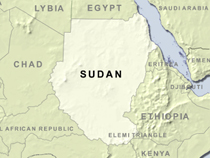2007年VOA标准英语-Officials in Southern Sudan Say North-South Agr(在线收听)
Capitol Hill
25 January 2007
Representatives from southern Sudan have appeared before a U.S. congressional committee on Capitol Hill to detail what they say are deliberate efforts by the National Congress Party government in Khartoum to undermine the two-year-old Comprehensive Peace Agreement between the north and south. VOA's Dan Robinson reports on testimony on Capitol Hill.
 |
| Sudan |
But the former rebel group has accused Sudan's president, Omar al-Bashir, of deliberately undermining the accord.
Luka Biong Deng, minister for presidential affairs for the government of South Sudan, told the House (of Representatives) Africa Subcommittee these efforts threaten to tear apart the Comprehensive Peace Agreement - the CPA.
"When we concluded the peace [agreement] we thought [it] would give a chance for the [National Congress Party], especially the extremists, [to] reform and smoothly [join] the normal democratic transformation in Sudan," said Luka Biong Deng. "But the anti-CPA members of the NCP are now in control of affairs, and I can attribute most of the delay to the deliberate strategy of derailing the implementation of the CPA."
He says Khartoum's resistance can be seen in under-resourcing of special committees including one on the North-South Border, the Assessment and Evaluation Commission, as well as oil resources and disarming of militias.
Barnaba Benjamin, minister for regional cooperation for the government of South Sudan, accuses Khartoum of deliberately trying to destroy the CPA by attempting to reduce its attractiveness for people in the south.
Khartoum's tactics, he adds, could result in the collapse of the agreement and a return to conflict.
"There is little attempt [by] the National Congress Party to realize that that country can break up unless the CPA is implemented in spirit and in letter," said Barnaba Benjamin.
The two southern representatives say it is now up to the United States, which had a dominant role in the negotiation of the CPA, to help prevent its collapse.
Roger Winter, former U.S. special representative for Sudan, agrees, saying unless the Bush administration works to prevent the collapse of the agreement, there could be a return to violence:
"If it is undermined through any of a number of possibilities, like the postponement of elections for example, it will lead to violence, it will be violence of the nature we now see in Darfur, and that would be terrible both for humanitarian reasons, and to our shame because it would be the end of a very stellar peace-making that we precipitated," said Roger Winter.
Winter calls the important concept in the CPA that all parties would help make the idea of unity attractive is now, in his words, a policy fiction.
The United States, Winter asserts, must correct an imbalance that was created by focusing primarily on events in Darfur while the Khartoum government pursued its agenda in the south.
No representatives of the Khartoum government were present at the hearing on Capitol Hill. Congressman Donald Payne, chairman of the House Africa subcommittee, explained that was a deliberate move on his part because of Khartoum government policies.
"As long as I am chairman of this committee, the government of Sudan is not welcome until they show they are a government of their people and for their people," said Donald Payne.
President Bush's Special Sudan envoy Andrew Natsios was scheduled to appear before the House Foreign Affairs Committee, but that hearing was postponed.